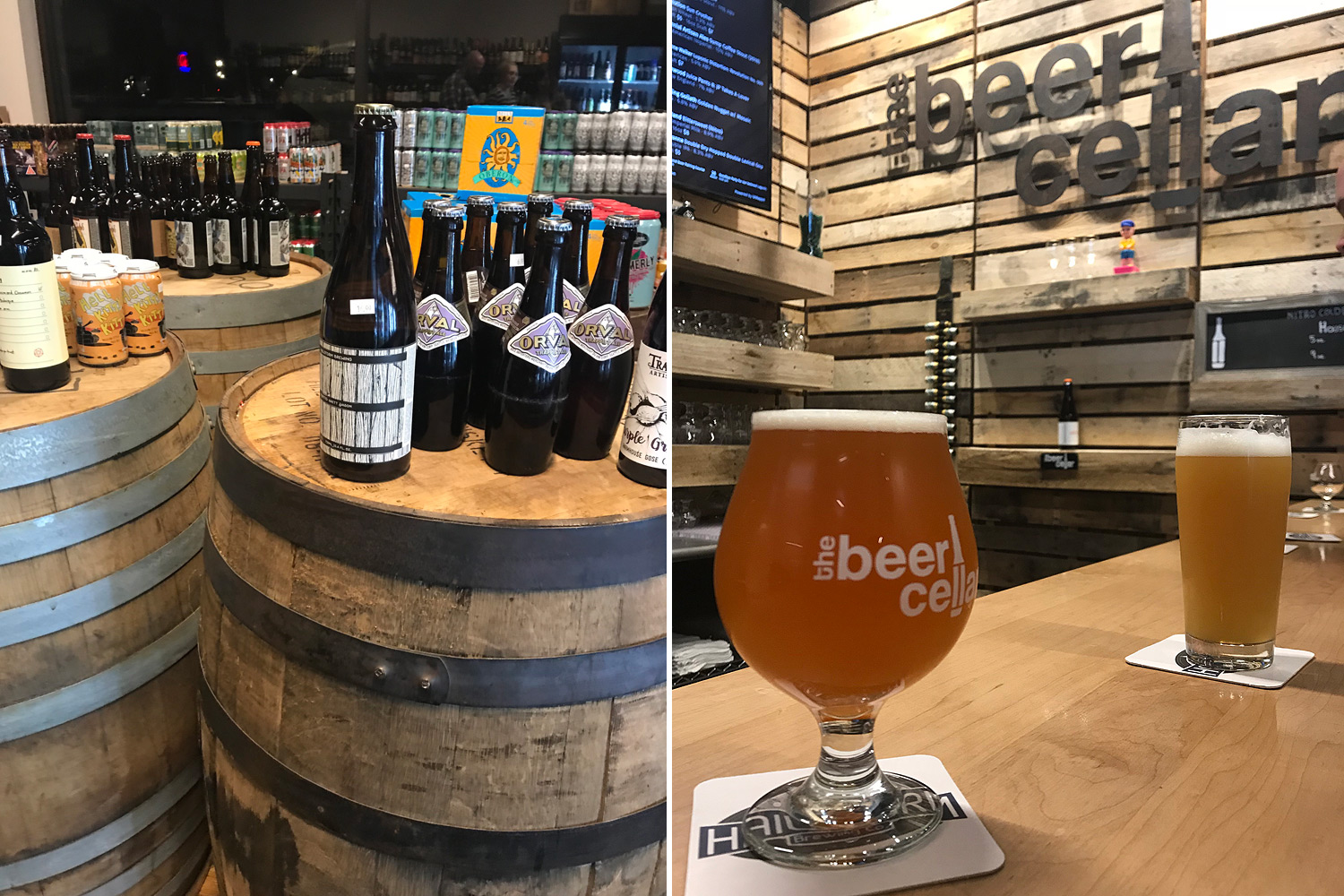At 4:00 on a Wednesday afternoon just a few weeks ago, Dave Hawley posts the news to Twitter, Facebook, and Instagram that there was new beer available at The Beer Cellar, his Glen Ellyn store. He’d driven to Hop Butcher, a craft brewery in Andersonville, that day to get a freshly canned IPA.
“I grabbed it right off the canning line,” Hawley said, perched at a table in view of the stack of beers and the row of stools at the bar in his shop.
Hawley, the bearded and gregarious proprietor of The Beer Cellar, started it from nothing in late 2013. It’s his community for the beer lovers who have made it their gathering spot in the western suburbs. Today he’d loaded up the brews from Hop Butcher into his van and driven them straight back to the store, and because of that, The Beer Cellar swelled with people on a mid-week afternoon.
By 4:45, the Hop Butcher was nearly sold out. “I have customers who joke with me that every tweet I send costs them a hundred dollars,” Hawley says.
This is the way Hawley has always wanted it. He greets nearly every customer by name, and most of them, even the ones stopping in on their way from the downtown Glen Ellyn Metra stop, linger for a while. They’re in a hurry until they walk through Hawley’s doors.
His idea for The Beer Cellar began six years ago, when Hawley took a trip to California with a few college buddies in the summer of 2012. An insurance salesman at the time, Hawley went from San Diego up to San Francisco with his group, where they ended up at City Beer Store, an enclave for craft beer enthusiasts on Folsom Street. Unlike most microbrew shops, this one had a small bar and a rotating tap list, so shoppers could sip something on draft while they shopped for a six pack. The atmosphere left an impression on Hawley, and when he got home, he told his wife he wanted to open something similar in the Chicago area.
Hawley soon picked up a side gig to get a sense of the business. “I got a job at a local liquor store to learn how to be a beer buyer, learn the industry, start meeting the people I needed to meet,” he says. “At the time I was kind of dipping my toe in to see if I wanted to do something in beer, if I wanted to make it more than a hobby.”
He also started brewing, and quickliy made up his mind which side of the business he wanted to be on.
“It’s like 80% cleaning. I don’t have the patience for that. When I knew I wanted to be in beer, I went and bought the homebrew setup and brewed a few batches. They were mediocre at best. I hated brewing, hated it,” Hawley said.
After he was laid off from his insurance job, Hawley began building his business out of what was practically the basement of a Starbucks in downtown Glen Ellyn, staying up until three in the morning in the final months of 2013 to get ready. It was not precisely what Hawley had envisioned—no parking, hard to find, cramped quarters—but it also allowed him to start up without borrowing from a bank or selling a share of the store.
“One piece of advice that I leaned on was never give up any of your company, never give up equity,” Hawley said. “We were profitable from day one.”
The Beer Cellar moved out of the basement, but it’s still small. Hawley tries to use that to his advantage.
“I have limited shelf space for a reason. I don’t want to put those C+ beers on my shelf,” Hawley said. “You deserve an A+ beer, I deserve an A+ beer, we only want to carry the best.”
There are a few breweries, like Half Acre and Marz, that he purchases from without tasting every new beer, but otherwise, he gathers at least one other staff member to taste new stuff. The Beer Cellar has gotten so popular that the breweries are seeking him out, and Hawley and his staff are discerning enough that they’ve turned away ten breweries in the last six months.
When distributors of Bourbon County Stout wanted Hawley to carry lesser beers in order to stock the sought-after bottles, Hawley said no and took a DIY approach, making his own imperial stout in collaboration with Michigan-based Transient Ales. Hawley leaned on friend and Beer Cellar employee Jeff Klausner, who owns Kernel Dan’s Kettle Corn, a staple at west suburban farmer’s markets, borrowing the giant kettle Klausner uses for his kettle corn to roast hundreds of pounds of coconut and delivering it to the brewer. His second collaboration, with Polyanna Brewing, is the double dry-hopped Lexical Gap, an IPA that he says hearkens back to what the style was like before beer drinkers fell in love with the hazy New Englands.
And he still makes his own brews about once a year, maintaining that anyone on his side of the business should do a batch every so often, just so they can appreciate how hard it is.
“Just to remind ourselves how lucky we are that we get to stand behind a bar and serve people,” Hawley says.



